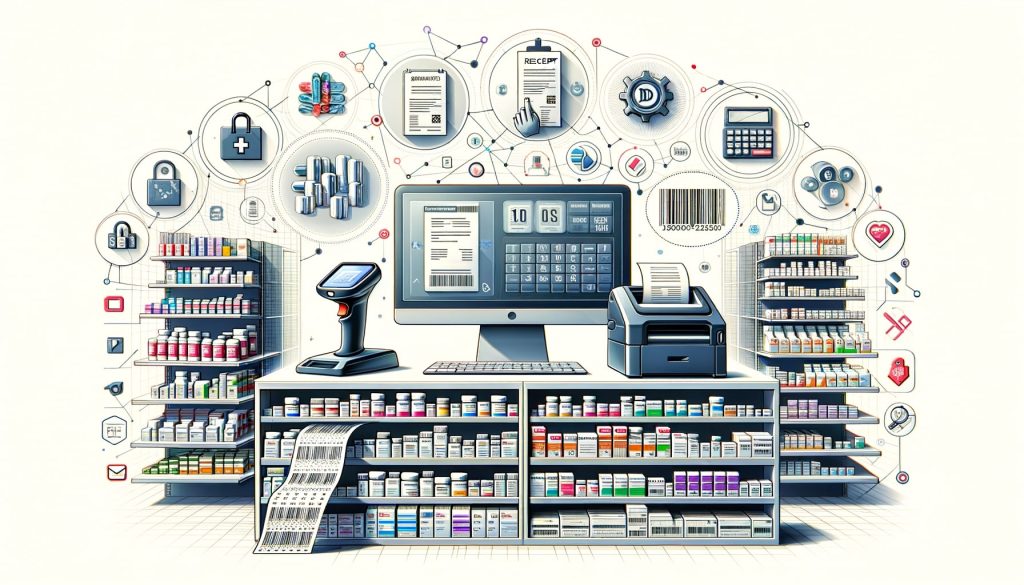In today’s fast-paced world, pharmacies need to streamline their operations and provide efficient services to their customers. One way to achieve this is by implementing a reliable and effective Point of Sale (POS) system. A POS system is a software and hardware combination that allows pharmacies to manage their sales, inventory, and customer information in a centralized and automated manner.
This article will guide you through the process of choosing the right POS system for your pharmacy, taking into consideration various factors and requirements.
Factors to Consider When Choosing a POS System for Your Pharmacy
When selecting a POS system for your pharmacy, it is crucial to consider several factors to ensure that it meets your specific needs and requirements. These factors include the size of your pharmacy, the volume of transactions, the complexity of your inventory management, and the level of integration with other systems. Let’s delve deeper into each of these factors.
- Size of your pharmacy: The size of your pharmacy plays a significant role in determining the type of POS system you should choose. If you have a small pharmacy with limited space, a compact and user-friendly system would be ideal. On the other hand, if you have a large pharmacy with multiple locations, you may need a more robust and scalable system that can handle high transaction volumes and provide centralized management.
- Volume of transactions: Consider the number of transactions your pharmacy processes on a daily basis. If you have a high volume of transactions, you need a POS system that can handle the load without slowing down or crashing. Look for a system that offers fast processing speeds and can handle peak hours efficiently.
- Complexity of inventory management: Pharmacies deal with a wide range of products, including prescription medications, over-the-counter drugs, medical supplies, and more. It is essential to choose a POS system that can handle the complexity of managing your inventory. Look for features such as barcode scanning, automatic reordering, expiration date tracking, and real-time inventory updates.
- Level of integration with other systems: Consider the other systems you use in your pharmacy, such as accounting software, electronic health records (EHR), or customer relationship management (CRM) systems. It is crucial to choose a POS system that can seamlessly integrate with these systems to avoid duplicate data entry and streamline your operations.
Assessing Your Pharmacy’s Specific Needs and Requirements

Before diving into the various types of POS systems available for pharmacies, it is essential to assess your pharmacy’s specific needs and requirements. This assessment will help you narrow down your options and choose a system that aligns with your goals. Here are some key areas to consider during the assessment process.
- Sales and transaction management: Evaluate your current sales and transaction management processes. Do you need a system that can handle multiple payment methods, such as cash, credit cards, and mobile payments? Are you looking for features like split payments, discounts, or loyalty programs? Assessing your sales requirements will help you choose a POS system that can cater to your specific needs.
- Inventory management: Analyze your current inventory management practices. Do you struggle with stockouts or overstocking? Are you looking for a system that can automate the reordering process based on predefined thresholds? Consider the features you need to efficiently manage your inventory and ensure that the POS system you choose offers those capabilities.
- Reporting and analytics: Determine the type of reports and analytics you need to monitor the performance of your pharmacy. Are you interested in sales reports, inventory reports, or customer analytics? Look for a POS system that provides comprehensive reporting and analytics features to help you make data-driven decisions.
- Customer management: Consider how you currently manage customer information and interactions. Do you need a system that can store customer profiles, track purchase history, or send automated reminders for prescription refills? Assess your customer management requirements and choose a POS system that can enhance your customer service and engagement.
Exploring Different Types of POS Systems for Pharmacies

Now that you have assessed your pharmacy’s needs and requirements, it’s time to explore the different types of POS systems available for pharmacies. Each type has its own set of features and benefits, so it’s important to choose the one that aligns with your specific needs. Let’s take a closer look at the various types of POS systems for pharmacies.
- Traditional on-premise POS systems: Traditional on-premise POS systems require you to install the software on your own servers and purchase the necessary hardware. These systems offer a high level of customization and control but require upfront investment and ongoing maintenance. They are suitable for larger pharmacies with dedicated IT resources.
- Cloud-based POS systems: Cloud-based POS systems, also known as Software-as-a-Service (SaaS) solutions, are hosted on remote servers and accessed through the internet. These systems offer flexibility, scalability, and automatic updates, eliminating the need for on-site servers and IT maintenance. Cloud-based systems are suitable for pharmacies of all sizes, especially those looking for cost-effective solutions.
- Mobile POS systems: Mobile POS systems allow you to process transactions using smartphones or tablets. These systems are ideal for pharmacies with limited counter space or those looking for mobility and flexibility. Mobile POS systems are often cloud-based and offer features like barcode scanning, digital signatures, and mobile payment integration.
- Integrated pharmacy management systems: Integrated pharmacy management systems combine POS functionality with other essential pharmacy management features, such as prescription processing, medication dispensing, and insurance billing. These systems provide a comprehensive solution for pharmacies looking to streamline their operations and improve efficiency.
Key Features to Look for in a Pharmacy POS System

When choosing a POS system for your pharmacy, it is crucial to look for key features that will enhance your operations and improve customer service. Here are some essential features to consider during the selection process.
- Prescription processing: Look for a POS system that can handle prescription processing efficiently. Features like electronic prescription routing, medication history tracking, and insurance billing integration can streamline the prescription fulfillment process and reduce errors.
- Barcode scanning: Barcode scanning is a must-have feature for any pharmacy POS system. It allows you to quickly and accurately scan product barcodes, retrieve product information, and update inventory levels in real-time. Look for a system that supports both 1D and 2D barcodes.
- Inventory management: Choose a POS system that offers robust inventory management features. Look for features like automatic reordering, expiration date tracking, low stock alerts, and real-time inventory updates. These features will help you optimize your inventory levels, reduce stockouts, and improve overall efficiency.
- Customer relationship management: Consider a POS system that includes customer relationship management (CRM) features. Look for features like customer profiles, purchase history tracking, loyalty programs, and automated reminders for prescription refills. These features will help you build strong relationships with your customers and enhance their overall experience.
- Reporting and analytics: Reporting and analytics are essential for monitoring the performance of your pharmacy. Look for a POS system that provides comprehensive reporting capabilities, including sales reports, inventory reports, and customer analytics. These reports will help you identify trends, make data-driven decisions, and optimize your operations.
Evaluating the Integration Capabilities of a POS System

Integration capabilities are crucial when choosing a POS system for your pharmacy. The ability to integrate with other systems, such as accounting software, EHR, or CRM systems, can streamline your operations and eliminate duplicate data entry. Here are some integration considerations to keep in mind.
- Accounting integration: If you use accounting software to manage your finances, choose a POS system that can seamlessly integrate with your accounting system. This integration will allow you to automatically sync sales data, track expenses, and generate financial reports without manual data entry.
- EHR integration: If you use an EHR system to manage patient records and prescriptions, look for a POS system that can integrate with your EHR system. This integration will enable you to streamline the prescription fulfillment process, reduce errors, and improve patient safety.
- CRM integration: If you use a CRM system to manage customer relationships and marketing campaigns, consider a POS system that can integrate with your CRM system. This integration will allow you to sync customer data, track purchase history, and personalize marketing efforts based on customer preferences.
- Payment gateway integration: Ensure that the POS system you choose can integrate with popular payment gateways to process credit card payments securely. Look for systems that support EMV chip cards, contactless payments, and mobile wallets to provide a seamless and secure payment experience for your customers.
Understanding the Importance of Security and Compliance in a Pharmacy POS System
Security and compliance are critical considerations when choosing a POS system for your pharmacy. Pharmacies deal with sensitive customer information and must comply with various regulations, such as HIPAA (Health Insurance Portability and Accountability Act) and PCI DSS (Payment Card Industry Data Security Standard). Here are some security and compliance features to look for in a pharmacy POS system.
- Data encryption: Ensure that the POS system you choose encrypts sensitive data, such as customer information and payment details. Encryption protects data from unauthorized access and ensures compliance with data security regulations.
- User access controls: Look for a POS system that allows you to set user access controls and permissions. This feature ensures that only authorized personnel can access sensitive data and perform specific actions within the system.
- Audit trails: Audit trails track and record all system activities, including user logins, transactions, and inventory updates. This feature helps you identify any unauthorized access or suspicious activities and ensures compliance with regulatory requirements.
- Compliance certifications: Check if the POS system vendor has obtained relevant compliance certifications, such as PCI DSS or HIPAA. These certifications demonstrate that the vendor follows industry best practices for security and compliance.
Comparing Pricing and Cost Considerations for Pharmacy POS Systems
Pricing and cost considerations play a significant role in choosing a POS system for your pharmacy. It is essential to evaluate the upfront costs, ongoing fees, and potential return on investment (ROI) of the system. Here are some pricing and cost factors to consider.
- Upfront costs: Consider the upfront costs of purchasing the POS system, including hardware, software licenses, and installation fees. Traditional on-premise systems often have higher upfront costs compared to cloud-based systems.
- Ongoing fees: Evaluate the ongoing fees associated with the POS system, such as monthly subscription fees, transaction fees, and support fees. Cloud-based systems typically have lower ongoing fees compared to on-premise systems.
- Return on investment (ROI): Calculate the potential ROI of the POS system by considering the time and cost savings it can provide. Look for features that can streamline your operations, reduce errors, and improve customer service. A system that offers a high ROI may justify a higher upfront investment.
- Scalability: Consider the scalability of the POS system. If you plan to expand your pharmacy or add new locations in the future, choose a system that can scale with your business without significant additional costs.
Selecting a Reliable Vendor and Support for Your Pharmacy POS System
Choosing a reliable vendor and support for your pharmacy POS system is crucial for a smooth implementation and ongoing maintenance. Here are some factors to consider when selecting a vendor.
- Vendor reputation: Research the vendor’s reputation in the industry. Look for customer reviews, testimonials, and case studies to gauge their track record and customer satisfaction levels.
- Experience in the pharmacy industry: Consider vendors that have experience working with pharmacies. They will have a better understanding of your specific needs and requirements and can provide tailored solutions.
- Training and support: Evaluate the training and support options provided by the vendor. Ensure that they offer comprehensive training for your staff and have a dedicated support team available to assist you in case of any issues or questions.
- System updates and maintenance: Inquire about the frequency of system updates and the vendor’s approach to maintenance. Regular updates ensure that your system remains up-to-date with the latest features and security patches.
Frequently Asked Questions (FAQs)
Q1. What is a POS system, and why is it important for pharmacies?
A POS system is a software and hardware combination that allows pharmacies to manage their sales, inventory, and customer information in a centralized and automated manner. It is important for pharmacies as it streamlines operations, improves efficiency, and enhances customer service.
Q2. What factors should I consider when choosing a POS system for my pharmacy?
When choosing a POS system for your pharmacy, consider factors such as the size of your pharmacy, volume of transactions, complexity of inventory management, and integration capabilities with other systems.
Q3. What are the different types of POS systems available for pharmacies?
The different types of POS systems available for pharmacies include traditional on-premise systems, cloud-based systems, mobile POS systems, and integrated pharmacy management systems.
Q4. What key features should I look for in a pharmacy POS system?
Key features to look for in a pharmacy POS system include prescription processing, barcode scanning, inventory management, customer relationship management, and reporting and analytics.
Q5. How important is security and compliance in a pharmacy POS system?
Security and compliance are crucial in a pharmacy POS system as pharmacies deal with sensitive customer information and must comply with regulations such as HIPAA and PCI DSS. Look for features such as data encryption, user access controls, and audit trails to ensure security and compliance.
Conclusion
Choosing the right POS system for your pharmacy is a critical decision that can significantly impact your operations and customer service. By considering factors such as the size of your pharmacy, volume of transactions, complexity of inventory management, and integration capabilities, you can narrow down your options and choose a system that aligns with your specific needs.
Look for key features such as prescription processing, barcode scanning, inventory management, customer relationship management, and reporting and analytics to enhance your operations. Additionally, prioritize security and compliance features to protect sensitive customer information and ensure regulatory compliance.
Finally, select a reliable vendor that has experience in the pharmacy industry and offers comprehensive training and support. With careful consideration and evaluation, you can find the right POS system that will streamline your pharmacy operations and contribute to your success.

